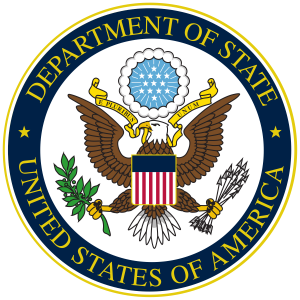By Sami Zaptia.
London, 23 June 2020:
In a statement released yesterday, the US State Department stressed the need for a military pause in Libya’s conflict and a return to negotiations.
The statement came after U.S Ambassador Richard Norland and AFRICOM Commander Stephen Townsend met Faiez Serraj, Libya’s internationally recognized prime minister, in Zuwara, Libya, the previous day.
The statement read: ‘‘In the context of escalating foreign intervention in Libya, the meeting focused on current opportunities for a strategic pause in military operations by all parties to the conflict.
Ambassador Norland outlined U.S. support for the diplomacy underway through UN auspices to promote a ceasefire and political dialogue. General Townsend presented his military perspective on the risk of escalation, the dangers posed by Russia’s support for Wagner operations, and the strategic importance of ensuring freedom of navigation in the Mediterranean.
“U.S. Africa Command provided the security that enabled this important Department of State engagement with Prime Minister Sarraj. We emphasized to the Libyan delegation that all sides need to return to UN-led ceasefire and political negotiations because this tragic conflict is robbing all Libyans of their future,” said General Townsend.
“The current violence fuels the potential resurgence of ISIS and Al Qaeda in Libya, is further dividing the country for the benefit of foreign actors, and prolongs human suffering. External actors should stop fueling the conflict, respect the UN arms embargo, and uphold commitments made at the Berlin Summit,” said Ambassador Norland.
In support of Libyan sovereignty, political stability, security and economic prosperity, the United States will deepen engagement with the full range of interlocutors from across the country’’.
The statement is seen as providing better clarity than previous statements that straddled the Berlin Libya conference outcomes and the Cairo initiative – thereby leaving enough cracks for the two contending sides to interpret differently.
It also comes on the back of Monday’s statement by the US National Security Council (NSC) which opposed military escalation in Libya by all sides.
The NSC tweeted; “We urge the parties to abide by the ceasefire and to resume negotiations immediately. We must build on the progress achieved through the UN 5 + 5 talks, the Cairo initiative and the Berlin process.”
It will also be recalled that the NSA statement came after Egyptian President Abdel Fattah Al-Sisi warned of his country’s military intervention in Libya in reaction to Turkish intervention. He had warned that Sirte and Al-Jufra airbase are a red line.
The forces representing the internationally recognized Libyan government in Tripoli had, it will be recalled, pushed the Khalifa Hafter-led forces away from Tripoli’s outskirts and out of western Libya up to the western outskirts of Sirte.
The Tripoli government sees it as its legitimate right to control all of Libya’s territory – including Sirte -and Jufra airbase believed to be used by Russia to support Hafter. More importantly, Tripoli seeks to control the important eastern oilfields now under Hafter’s control which account for two-thirds of Libya’s oil production.
https://www.libyaherald.com/2020/06/21/egypt-readies-army-for-intervention-in-libya-declares-sirte-and-jufra-a-red-line/
https://www.libyaherald.com/2020/06/07/cairo-libya-peace-initiative-seen-as-attempt-to-keep-hafter-and-saleh-relevant-so-far-ignored-by-tripoli/
https://www.libyaherald.com/2020/04/25/hor-head-ageela-saleh-proposes-8-point-political-initiative/
https://www.libyaherald.com/2020/06/21/russia-denies-us-claim-of-its-newly-arrived-fighter-craft-active-in-libya/
https://www.libyaherald.com/2020/06/19/there-is-new-evidence-of-russian-aircraft-active-in-libyan-airspace-africom/






